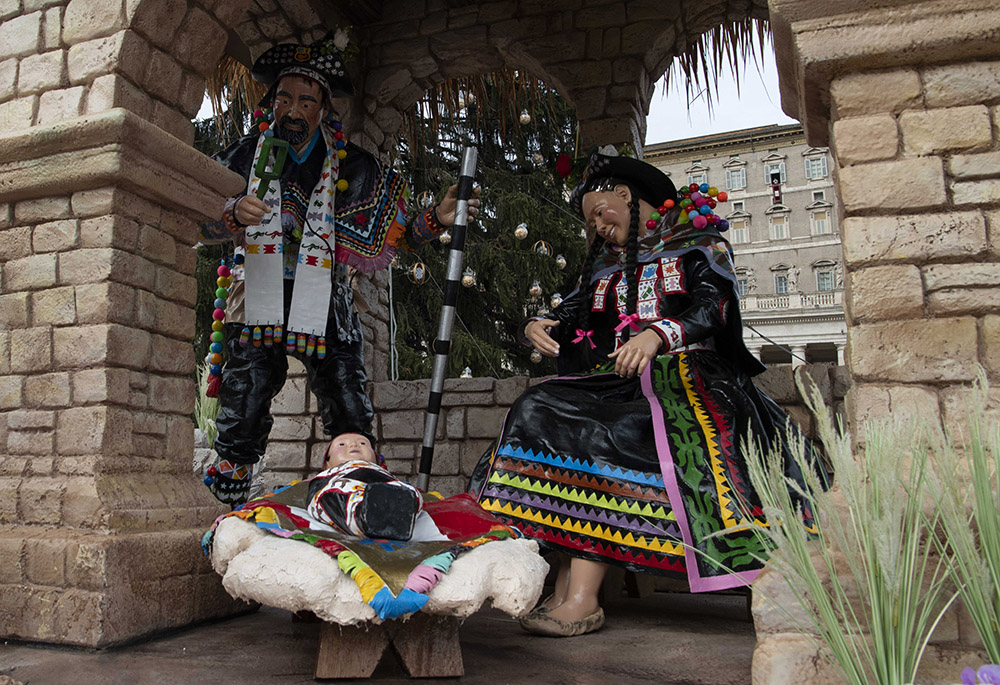
A Nativity display is pictured as Pope Francis recites the Angelus prayer on the feast of the Holy Family, Dec. 26, 2021, in St. Peter's Square at the Vatican. The pope said as a "Christmas gift" he had written a letter to families. (CNS/Vatican Media)
This feast of the Holy Family invites us to think about our understanding of family. The first reading from the Book of Sirach, a text that is part of the wisdom writings and tradition, is classically read as a father's address to his son. The father instructs on how a son is to behave toward his father and essentially, how all children are to "revere" their parents. This selection from Sirach is supposed to offer us wisdom about family. But does it?
The biblical text presumes a heteronormative, patriarchal family structure that includes male and female parents — and probably both male and female children, too. Twenty-first century families are often very different from the one portrayed in Sirach. Today's families might consist of single parents, same-sex parents, foster or adoptive parents, stepparents, grandparents with custody or various other expressions.
Additionally, time and growing consciousness have raised the question: Should all parents be respected and honored? What if they caused great suffering? This reading from Sirach speaks to an idealized family situation. How are children suffering within harmful family units to make sense of this reading when they hear it proclaimed in church? What is the wisdom to be gained?
The question challenges us to expand our notion of "family," to see ourselves as part of the family of the Divine One who brought us all into being. With this new framework, family becomes a series of interrelated, interpersonal and intergenerational relationships. For these relationships to grow and flourish in meaningful ways, mutual respect needs to be one of the starting points — not authority, fear, dominance or paternalism.
The other starting point needs to be love, the central theme of the second reading from Colossians.
Advertisement
As members of the Divine One's family, we are called to learn the way of love. Within this household are "elders" and those younger. The way of love beckons the elders to act responsibly, to share with younger members the wisdom gained from experience and to be open to the wisdom learned from younger members as well. The way of love also calls for the exercise of heartfelt compassion. In this household, younger members and elders alike are called upon to bear with one another and be patient. Both elders and younger members will struggle, make mistakes, disappoint and falter. The way of love entails forgiveness when expectations are not met and when feelings are hurt.
This way of love between elders and children is palpable in the Gospel reading from Luke.
This way of love between elders and children is palpable in the Gospel reading from Luke.
In pondering today's passage from Luke, one might say that 12-year old Jesus was not a model son. After participating in a family outing to Jerusalem to celebrate the feast of Passover, the young boy goes his own way and becomes separated from his parents and their traveling caravan. This separation leads to devastation and worry on the part of his parents, who eventually find him after three days. The parents confront the child, expressing their feelings of consternation. Clearly Jesus had displeased them, caused them worry, suffering, pain and grief.
The young Jesus asks a rather glib question in response. These parents would have to bear with, try to understand and forgive their young son when he made a stunning decision to stay back and dialogue with the teachers in the temple. Here we have an example of parents — wise "elders" — allowing their child, a younger member in the household of the Divine, to do what he needs to do. And their love for him never wavered.
Collectively, these three readings offer us wisdom. Family needs to be reenvisioned, and mutual love and respect must be the foundation for all relationships.
